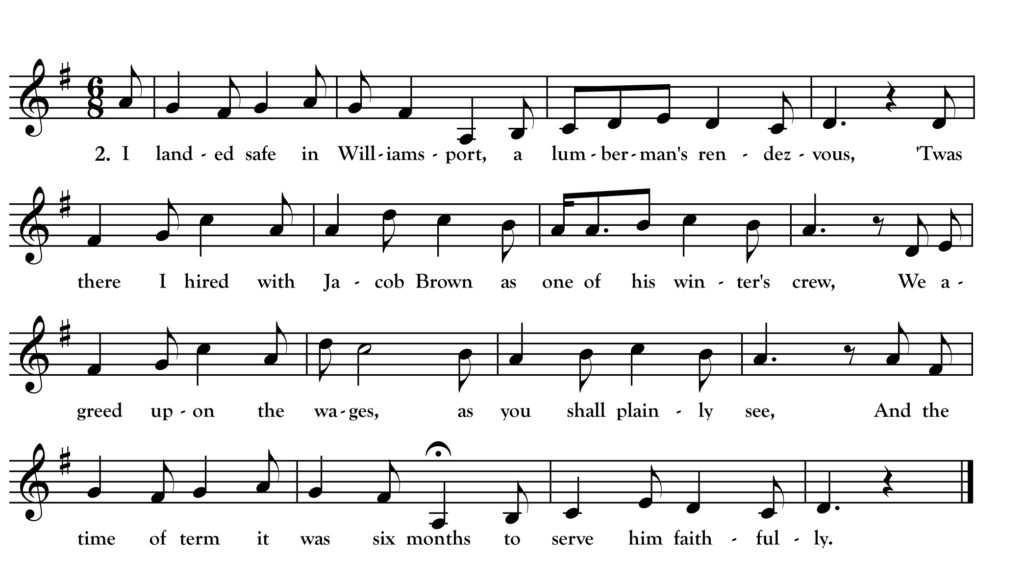Morzie Ellsworth
My name is Morzie Ellsworth the truth I’ll tell to you,
I’m in the prime of manhood and my age is twenty-two,
On the fourteenth of October last, I boarded on a train,
And bound for Pennsylvania, I left the state of Maine.
I landed safe in Williamsport, a lumberman’s rendezvous,
And there I hired with Jacob Brown as one of the winter’s crew,
We agreed upon the wages, as you shall plainly see,
And the time of term it was six months to serve him faithfully.
He gave to me a sheathing belt, likewise a bowie knife,
A battle axe and carbine gun for to defend my life,
But woe be on the morning when I did undertake,
A voyage to the forest for gold and riches sake.
There’s the tomtit and the moose-bird and the roving caribou,
The lucifee and partridge that through the forests flew,
And the wild ferocious rabbit from the colder regions came,
And several other animals too numerous to name.
And when the snow began to melt the foreman he did say,
“Lay down your saws and axes boys, and haste to break away,
For the broken ice is floating now in business we will thrive,
And you able-bodied shanty-boys are needed on the drive.”
It would melt your heart with pity, it would make your blood run cold,
To see the work that Nature did in all her rudest mould,
And to see those overhanging rocks along the ice-bound shore,
Where rippling waters fierce do rage and cataracts do roar.
So to conclude and finish, I have one thing more to say,
When I am dead and in my grave, a-mould’ring in the clay,
No artificial German text you can for me sustain,
Just simply say, “Here’s a roving wreck that came from Bangor, Maine.”
Ninety-five years ago, in the summer of 1923, Franz Rickaby collected a version of the above song in Bayport, Minnesota (south of Stillwater) from former lumberjack Hank Underwood who called it “The Maine-ite in Pennsylvania.” Underwood’s four verse version (verses 2, 4, 6 and 7 above) likely descended from the New Brunswick song “Morris Ellsworth” which satirizes a greenhorn logger from Prince Edward Island who comes to the Miramichi woods to log. The St. Croix Valley where Underwood was born, had a high concentration of immigrant loggers from the Miramichi region – including Underwood’s parents.
Jokes and stories making fun of inexperienced men in the logging camp – especially their fear of animals – were common in the woods. According to folklorist Edward Ives, PEI men were looked down upon in Miramichi. Interestingly, Rickaby reported that “State of Maine” men were often foremen or bosses in Minnesota. Underwood likely learned his version while logging in Pennsylvania where, perhaps, Maine-ites had a different reputation. For a biography of Hank Underwood see the liner notes to my CD Minnesota Lumberjack Songs which also includes an arrangement of this song.
For the version above, I use a melody very close to Underwood’s melody and extend his text with extra verses added in from one of the Miramichi versions and one verse pulled from “Jim Porter’s Shanty Song” also collected by Rickaby.

